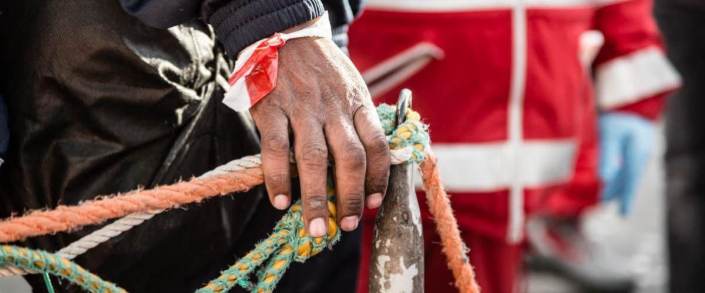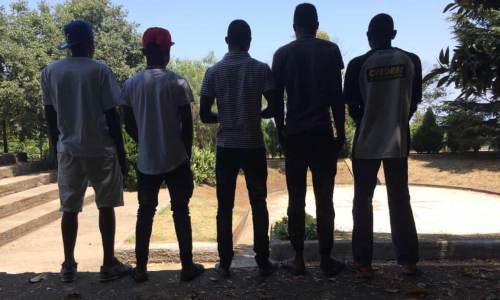Why The Proactiva Has Been Released. The Judge: “There Are No Safe Ports In Libya”.
From Meridionews.it – The Justice of Preliminary Investigations in Ragusa has rejected the local prosecutor’s request to maintain the seizure of the Open Arms. In the decree, he emphasises how the accusations are situated in a context of total uncertainty. According to the judge, the current issue is nothing more than “disobedience in the face of orders”. There is little evidence relating to intent, especially considering the few guarancies provided by Libyan authorities.
Independent of the existence of a real Search and Rescue Zone and of Italy’s efforts to train the Libyan Coast Guard, Libya still cannot demonstrate the minimum conditions necessary to provide a ‘place of safety‘. This is the most important moment in the decree emanating from the judge in Ragusa, Giobanni Giampiccolo, in his rejection of the request for the confermation of the seizure of the ship belonging to the Spanish NGO ‘Proactiva’, a request made by head of prosecution Fabio D’Anna and Santo Fornasier, MP. The Judge for Preliminary Investigations made his statement after the file had been transferred from Catania to the provincial capital of Ragusa following the removal of the accusation of “criminal association” that had been supported by the Catanian magistrates following the events that took place in the Mediterranean Sea on 16 March 2018. On that day, the ship had undertaken the rescue operation of more than 200 migrants who found themselves on a rubber boat engaged by crew from the Libyan Navy Coast Guard.
“Rescue operations do not end with merely saving migrants at sea, but must be carried through and conclude with their landing in a safe place, as provided for under the International Convention on Maritime Search and Rescue signed in Hamburg in 1979”, the judge writes. He then clarifies that, on the basis of a resolution adopted in 2004 by the Maritime Safety Committee in 2004, a place of safety means one in which a person’s life is no longer under threat. This cannot therefore mean Libya. “Faced with the information currently available, that indicates that Libya is still a place in which serious violations of human rights take place, with people detained in detention centres in overcrowded conditions without access to medical care or adequate nutrition, and subjected to maltreatment, rape and forced labour” – the judge emphasises – “it cannot be shown that migrants saved at sea can be provided with acceptable protection in Libya or a part of its territory.”
These reflections are important enough to also impact on the fact that, according to the judge, the NGO’s actions included moments that can be interpreted as “a disobedience in the face of orders given by the authorities entrusted with the coordination of the rescuing.” In his own reconstruction, the judge shows that, as he puts it, the NGO brought the rescue operation to its conclusion, even if it had been told by the command centre of the Italian Coast Guard that the Libyans had taken control of the intervention The Italian Coast Guard in its turn was informed by the Italian navy vessel Capri that, within the remit of the operation Naruas, it manages relations with North African maritims authorities.
According to the judge, nor are the elements necessary for the continued seizure of the Open Arms present in that which occurred afterwards, i.e. when the ship neared the Maltese coast. The small island to the south of Sicily entered into play in the events in the moment in which the NGO’s crew understood that it was necessary to urgently land a new born child in a serious state of health. The Maltese authorities – who usually do not authorise migrant receptions – accepted the request to take charge of the small child and her mother, making their own motorboat available for the transfer. Once the child was safe, the ship’s commander, Marc Reig Creus – invetigated along with the mission captain Ana Isabel Montes Mier – decided to continue towards Sicily, without asking to land at Malta, obtaining persmission from the Italian Coast Guard to land in the port of Pozzallo. For the Catanese magistrates, led by Carmelo Zuccaro, this decisions supposedly shows a clear intention to aid the illegal entrance of migrants into Italy, while the NGO’s lawyers maintain that the decision derived merely from experience informed by past activities.
As for the Ragusan judge, on the one hand he claims that the fact that Malta has never taken on a role as a protagonist in migrant reception “does not in any concrete way mean an automatic and implicit refusal of assistance”, implying that the Proactiva ought to have attempted to land. On the other hand, he admits the existence of some elements of uncertainty that render the identification of intent extremely difficult. Among these, Giampiccolo includes not only the lack ot ratification of the decisions of the Search and Rescue (SAR) and Safety of Life at Sea (SOLAS) conventions that are meant to govern issues relating to the identification of places of safety, but also the awareness by the Italian authorities themselves – beginning with the Italian Coast Guard – that up till today, Valletta has never been a partner in the management of the migrational flows.
Simone Olivelli
Project “OpenEurope” – Oxfam Italia, Diaconia Valdese, Borderline Sicilia Onlus
Translation by Richard Braude



